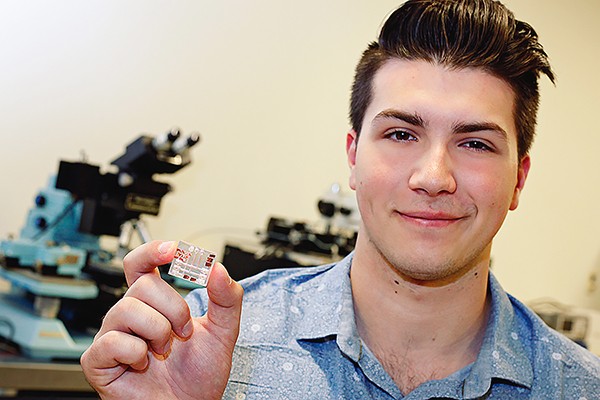 Austin Liolli, a second-year electrical and computer engineering student and member of UWindsor’s MicroNanoSystems Research Group, displays a 3D lab-on-a-chip developed at UWindsor. He will present his LOC research at the International Mechanical Engineering Congress and Exposition on November 15 in Phoenix, Arizona, as one of the top five finalists in the prestigious Young Engineer Paper contest.
Austin Liolli, a second-year electrical and computer engineering student and member of UWindsor’s MicroNanoSystems Research Group, displays a 3D lab-on-a-chip developed at UWindsor. He will present his LOC research at the International Mechanical Engineering Congress and Exposition on November 15 in Phoenix, Arizona, as one of the top five finalists in the prestigious Young Engineer Paper contest.
A University of Windsor engineering student will represent Canada on an international stage with a device that can help researchers detect diseases and pathogens, identify pollutants or test material properties on a microscale quicker than ever.
Austin Liolli’s innovative design, developed with the aid of professor Jalal Ahamed, improves the efficiency of a lab-on-a-chip (LOC) — a device that shrinks and integrates processes performed in a bench-top laboratory on a chip that fits in the palm of your hand.
The two authored a peer-reviewed research paper that has been selected as one of the top five finalists in the prestigious Young Engineer Paper (YEP) Contest at the American Society of Mechanical Engineers’ (ASME) upcoming International Mechanical Engineering Congress and Exposition (IMECE), the largest mechanical engineering conference in the world, which typically attracts 4,000 scientists and engineers from more than 75 countries.
Liolli, a second-year, electrical and computer engineering student and UWindsor Outstanding Scholar, will present at the 2016 IMECE in Phoenix, Arizona, on November 15 as the sole Canadian finalist. The ASME will provide him with $750 for travel expenses and complimentary conference registration.
Liolli’s next-generation, lab-on-a-chip research decreases the amount of time it takes to mix and analyze fluids, such as a drop of blood or saliva, and enables users to 3D print a custom chip design for rapid production.
“One prototype can be used for various tasks,” he says. “If the user feels they’re not getting efficient results on their chip, they don’t have to manufacture a new chip, which is costly and time consuming; they can simply program a different input signal.”
Compared to other devices, Liolli’s design reduces the dilution concentration range by 25 per cent, resulting in more accurate and uniform mixing in an area as thin as a strand of hair.
“Austin’s proposed design is unique because he is applying an electrical field in a three-dimensional manner, giving the user tremendous details that couldn’t be seen before,” said Dr. Ahamed, Liolli’s faculty advisor and director of UWindsor’s MicroNanoSystems Group. “Austin’s achievement is an ideal example of our undergraduate research success.”
